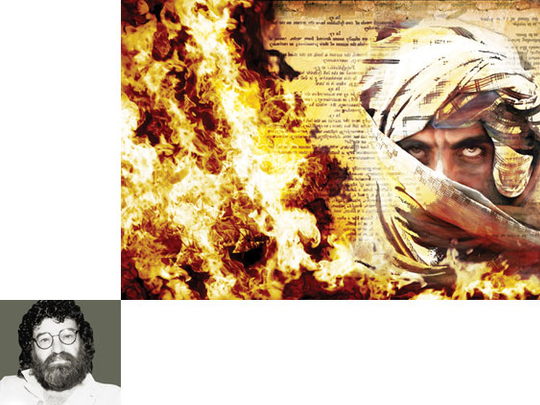
In March 2001, Taliban fighters solemnly gathered around the giant Buddha statue, a famed 6th century monument in the Bamiyan Province of Afghanistan, laid explosives at its feet and blew it to smithereens. Mullah Omar Mohammad, then the group’s leader, had proclaimed triumphantly: “Muslims should be proud of smashing idols [for] it gives praise to God that we have destroyed them.”
More recently, the brutish group known as Ansar Dine — dubbed by the western media as “Islamist rebels” — who invaded Timbuktu, turned into rubble centuries-old mausoleums recognised by Unesco as world treasures, burned ancient caligraphed manuscripts, tore down libraries and destroyed priceless cultural artefacts. Said one of their spokesmen: “The destruction is a divine order.”
This madness clearly represents neither “praise to God” nor a “divine order” from Him. It was rather a display of fanaticism mockingly remote from the teachings of Islam and its civilisational heritage, which for centuries was suffused with intellectual inquisitiveness and a reverence for ideas. In recent years, all the way from Afghanistan to Mali, from Egypt to Yemen and from New York to Bali, “Islamist rebels”, purporting to speak in the name of Islam — a faith that at its pivot correlates humanism to humane social conduct — have let loose poisonous passions.
How does one make this insane material susceptible to reason and analysis? Where does one locate the topic in a rational grid?
To be sure, the burning of books, along with other, similar barbaric acts, such as the hounding of the unorthodox, the obliteration of libraries, the suppression of free thought, the destruction of works of art deemed a threat to conformity, and the rest of it, is not unique to these self-styled soldiers of Islam. From the Inquisition in Spain to Nazi excesses in Germany, burning books, a reprehensible crime no less to book lovers than to lexicographers (who dubbed it ‘libricide’) was rampant.
In his 1821 play, Al Mansour, the German playwright Heinrich Heine, referring to the burning of the Quran during the Spanish Inquisition, wrote: “Where they burn books, so too will they burn human beings?. (And so it transpired.) Ironically, over a century later, Heine’s own books were among the thousands of volumes that, in the mid-1930s, were torched by the Nazis in Berlin. And consider Ray Bradbury’s iconic work, Farenheit 451 (1953), a novel about a dystopian world where books are outlawed, confiscated and later torched by the sinister ‘Fireman’. Bradbury wrote later that it was the Nazi book-burnings in Berlin’s Opernplatz that drove him to compose his masterpiece. “It follows then”, he said, “that when Hitler burned a book, I felt it as keenly — please forgive me — as his killing a human”.
Imagine further, if you will, the unspeakable grief that Arabs had felt when their beloved Baghdad Library, known as the House of Wisdom (Beit Al Hikmah), a major intellectual hub founded by Haroun Al Rashid, was burned down by the army of Hulagu during the Mongol invasion in 1258. Nasr Al Dine Al Tusi, the Persian polymath who was the librarian at the time, reportedly “knelt down in prayer” to thank God with “all the might he could muster” that he was able to rescue a “mere” 400,000 manuscripts” before the siege. Imagine, in like manner, the equally unspeakable grief that Palestinians felt during the Israeli occupation of Beirut in 1982 when Israeli troops stormed the premises of the Palestine Research Centre, repository of the Palestinian people’s heritage, and absconded with its archives, trucking them all to Israel.
Cultural effusions
As far as one is able to take any coherent view of it all, the phenomenon of destroying the heritage of another people lies far too deep. It speaks not only of the insecurity of the destroyer but also of his pathology, his demented need to lash out. When you torture a man to death, you take away his life. Destroy his heritage, however, and you mutilate his soul for generations. Moreover, there is indeed such a thing as a “human heritage”, a system of knowledge whose subsystems have, for more than 2,000 years, been interactive, with the cultural effusions of one nation echoing, mirroring and alluding to the whole. Impoverish one, and you impoverish all by a notch. We are, after all, each others’ guests in the global dialogue of cultures. Ask Unesco officials to explain the raison d’etre of their organisation.
Back to Timbuktu, that fabled place known fondly as the City of 333 Saints, what the rebels wreaked there was more than murderous carnage. They in effect made a statement, albeit unintentionally: There is a symbolic link between bestiality and the inflationary collapse of a society’s elan. These folks who pathetically presented themselves as men possessed of a more “authentic understanding of Islam” than other mortals, maiming those who queried the pertinence of their calling, were in fact the detritus of society, cast-outs with anarchic ideas.
In the end, however, the struggle against these Dark Age warriors will not be confined to the terrain of Mali and Yemen and Afghanistan and elsewhere where they roam free to, say, shoot in the head someone like 15-year-old Malala Yousufzai, because she advocated education for girls, but in how Muslim cultures in the coming years confront the challenges of modernity, in how they come finally to grasp and inhabit the underlying “subconscious” of Islam — its true, liberal, tolerant values, values that give coherence, as they had once done in history, to our thoughts and actions.
Fawaz Turki is a journalist, lecturer and author based in Washington. He is the author of The Disinherited: Journal of a Palestinian Exile.










